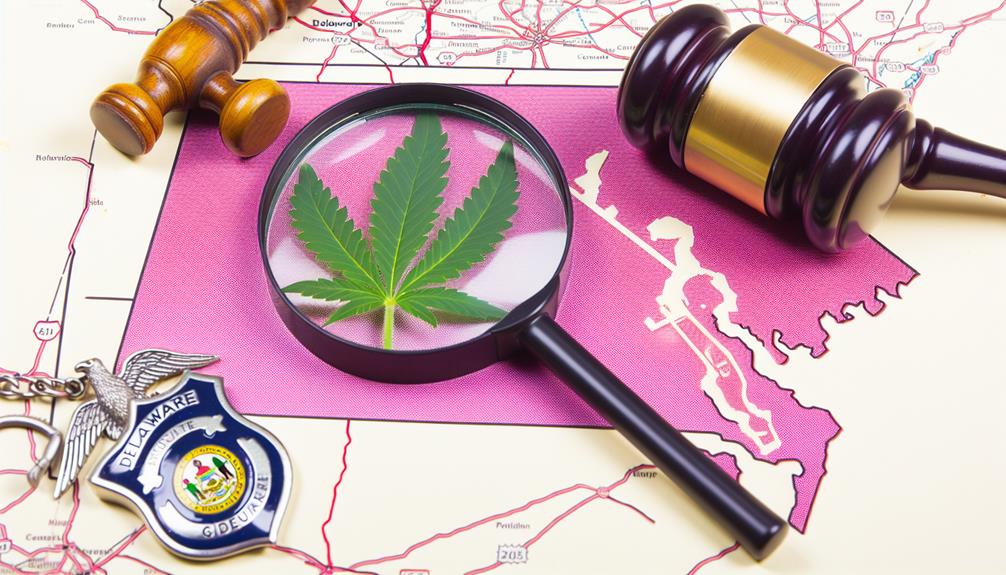Did you know that as of 2021, Delaware has over 15,000 registered medical marijuana users? This is a significant increase from just a few years ago. In response to this growing patient population, Delaware’s medical marijuana laws have undergone considerable changes. These shifts aim to improve patient access, enhance protections, and streamline the registration process. But what does this mean for you? Let’s delve deeper into these recent amendments and their implications.
Table of Contents
Understanding Delaware’s Medical Marijuana Program

To fully comprehend the intricacies of Delaware’s Medical Marijuana Program, it is essential to understand its legislative history, the qualifying conditions for use, and the process of obtaining a medical marijuana card. The program was established in 2011 when Senate Bill 17 – also known as the Delaware Medical Marijuana Act – was signed into law. This legislation provides a legal framework for the use of medical marijuana with an emphasis on Program Accessibility and Patient Confidentiality.
Let’s now explore the qualifying conditions. These are specific medical conditions ranging from cancer and HIV/AIDS to post-traumatic stress disorder and severe pain that enable a patient to apply for medical marijuana use. The inclusivity of this list reflects an understanding of diverse health challenges people face.
The process of obtaining a medical marijuana card in Delaware involves several steps. Initially, you’ll need written certification from a licensed physician stating that you have a qualifying condition. Following this step, you’ll submit an application to the Division of Public Health. It’s important to note that the program places a high emphasis on Patient Confidentiality, ensuring your private health information remains secure. Navigating these steps is crucial for accessing the benefits of the program.
Recent Amendments to the Law
Over time, Delaware’s medical marijuana laws have seen significant changes aimed at enhancing accessibility and overall effectiveness for qualifying patients. These recent amendments have profoundly impacted how the program operates.
Key among these amendments are changes in tax implications and reciprocity policies. In terms of taxation, legislators have made strides towards reducing financial burdens on patients. Medical marijuana is now exempt from state sales tax – a significant relief for those relying on this treatment.
In terms of reciprocity policies, Delaware has broadened its acceptance of out-of-state medical marijuana cards. If you’re a patient from another state with a valid medical marijuana card, you’re permitted to purchase and possess medical marijuana in Delaware. This policy change is particularly beneficial for tourists or temporary residents, ensuring they can continue their treatment without interruption.
These changes reflect Delaware’s commitment to improving patient access to medical marijuana by streamlining processes, reducing costs, and expanding eligibility criteria. However, while laws are becoming more accommodating, they still demand strict adherence. Future changes will likely continue enhancing the program’s effectiveness and reach.
Eligibility Criteria for Patients

Understanding who qualifies for medical marijuana in Delaware is crucial, as the state has set specific criteria for patient eligibility. Familiarizing yourself with these rules ensures you or your loved ones can access the therapeutic benefits of medical marijuana legally and safely while maintaining patient privacy.
To be eligible for medical marijuana in Delaware, you need to:
- Be a resident of Delaware with proof of residency.
- Have been diagnosed with a qualifying medical condition by a certified physician.
- Be at least 18 years old, although minors can apply with parental consent and proof of guardianship.
These conditions can include severe and chronic pain, nausea, seizures, or muscle spasms among others. The law is designed to ensure you’re being treated for a legitimate medical concern rather than recreational use.
Patient privacy is paramount in Delaware’s medical marijuana laws. Your medical records and personal information will be protected and won’t be shared without your consent. Understanding these eligibility criteria is the first step towards accessing the therapeutic benefits of medical marijuana in Delaware. Remember that the law exists to protect and serve you.
Registration Process for Patients
Once you’ve determined your eligibility for medical marijuana in Delaware, it’s essential to navigate the registration process accurately and diligently. The state maintains strict standards to ensure patient privacy and uphold program integrity.
You’ll start by completing an online application found on the Delaware Health and Social Services website. Here, you’ll provide personal information, proof of residency, and written certification from a Delaware-licensed physician affirming your qualifying condition. It’s important to note that your information will be safeguarded under stringent patient privacy laws so that you can proceed confidently.
The registration process also includes application fees necessary to cover administrative costs associated with running the program. Currently, this fee stands at $125 and must be paid annually. This fee is non-refundable, so ensure all your information is correct before submission.
Also, remember to renew your registration annually. The state will send a reminder 90 days before expiry, but it’s your responsibility to complete the renewal.
Navigating this process requires attention to detail and an understanding of the system. It’s not just about gaining access to medical marijuana; it’s a commitment to compliance with Delaware’s laws and respect for the rules that protect everyone involved.
Role and Responsibilities of Caregivers

In the realm of medical marijuana use in Delaware, caregivers play a pivotal role with unique responsibilities and duties. As a caregiver, you must understand and navigate the complexities of state medical marijuana laws and regulations. This involves assisting patients with their medical marijuana needs while also bearing important legal and financial implications.
Your responsibilities generally include:
- Ensuring a legal supply of medical marijuana for your patient
- Assisting in administration or consumption as needed
- Managing any related financial matters
Caregiver training is an essential aspect of your role. This training equips you with the knowledge and skills necessary to serve patients safely effectively. It covers various topics from legal aspects of medical marijuana use in Delaware to basics on handling and administering the drug.
Financial implications are another significant part of your responsibilities. As a caregiver, you’re required to manage the financial aspects of your patient’s medical marijuana use. This may involve handling payments for the drug, managing insurance matters, and even dealing with the cost of your own training.
Healthcare Providers and Medical Marijuana
Healthcare providers play a critical role in both patient care and legal compliance within the medical marijuana landscape. It’s crucial they stay informed about changes in Delaware’s medical marijuana laws for effective provider education and patient counselling.
As a healthcare provider, you must understand the legal boundaries and therapeutic benefits associated with medical marijuana. This knowledge is vital not only to ensure you’re acting within the confines of law but also to provide optimal care for your patients.
Provider education is key. Through continuous learning, you’ll be better equipped to navigate complexities of law. You’ll be able to accurately inform patients about their rights, potential risks and benefits as well as guide them on how to use medical marijuana effectively.
Patient counselling is equally important. It’s your responsibility to help patients understand implications of using medical marijuana. By offering sound advice, you can help them make informed decisions about their treatment options and manage any potential side effects.
In essence, your role bridges gap between legal framework and patient care making you an invaluable part of medical marijuana landscape.
Cultivation and Distribution Regulations

When it comes to cultivation and distribution, it’s crucial to understand the intricacies of Delaware’s updated medical marijuana regulations. You’ll need to comprehend how these changes impact you, especially in terms of zoning restrictions and tax implications.
Primarily, zoning restrictions stipulate where you can grow and distribute medical marijuana. They’re precise and can significantly restrict your operations if not adhered to. You can’t just set up shop anywhere; you must heed these regulations to avoid legal repercussions.
Similarly, tax implications are substantial. The financial aspect of your operations will be affected, and you must be ready to navigate these waters.
In summary:
- Zoning restrictions determine the location of your operations. Be mindful of them to stay within confines of law.
- Tax implications will significantly impact your finances. Ensure you’re well-versed in these regulations to prevent potential pitfalls.
- Complying with both elements will ensure you’re operating legally and ethically.
Staying abreast with these laws isn’t just about legality; it’s about serving patients effectively and ethically. Always remember that your goal is assisting those in need, understanding these regulations is a crucial step towards achieving this goal.
Legal Protections for Patients and Caregivers
Understanding legal protections for patients and caregivers is crucial when dealing with Delaware’s medical marijuana laws. These laws provide certain protections key among them being patient confidentiality and in some cases insurance coverage.
Patient confidentiality is a fundamental right under Delaware’s medical marijuana program. It’s illegal for state authorities to disclose patient information without explicit consent safeguarding privacy rights. This confidentiality extends also extends caregivers ensuring their information remains private as well so that they can participate in program with peace of mind knowing their details are secure.
Equally important is insurance coverage. While federal law still classifies marijuana as a Schedule I drug meaning most insurance companies won’t cover it, Delaware law doesn’t explicitly prevent insurance companies from providing coverage. This ambiguity allows for potential coverage of medical marijuana expenses particularly in cases where traditional treatment has been ineffective.
Penalties for Non-Compliance

While Delaware’s medical marijuana laws offer certain protections, they’re also stringent on non-compliance imposing penalties that you should be aware of. Consequences of non-compliance can be severe creating legal repercussions that can drastically impact your life.
Understanding potential penalties can help ensure you’re following the law correctly. Here are some key points to consider:
- If you’re caught possessing, selling or cultivating marijuana without a valid medical card or outside the boundaries of law, you could face criminal charges ranging from fines to jail time depending on severity of offense.
- Misrepresentation to a law enforcement officer – claiming you’re legally allowed to possess marijuana when you’re not – is also punishable offense.
- Overstepping boundaries of the law such as possessing more than allowed quantity can result in revocation of your medical marijuana card.
It’s crucial that you understand these legal repercussions and adhere strictly to laws as they stand not only for your own wellbeing but also uphold integrity of medical marijuana program. Remember that the law exists to protect patients who genuinely need access to this therapeutic option. Don’t risk penalties of non-compliance.
Future Outlook: Proposed Changes to the Law
Looking ahead, it’s important for you to be aware of potential changes to Delaware’s medical marijuana laws that are currently under consideration. The impact of these changes could significantly alter use and distribution of medical marijuana in state.
One such proposal involves expanding list of qualifying conditions for medical marijuana use. This is in line with medical advancements that have shown potential benefits of marijuana in treating a wider range of illnesses. If implemented, this change could allow more patients access to this form treatment.
Another proposed amendment seeks to increase number of licensed dispensaries in state improving accessibility and reducing burden on existing dispensaries.
A third proposal is to allow home cultivation for patients. This is a controversial proposal as it raises concerns about regulation and public safety.
Your awareness and understanding these potential changes are crucial allowing you better serve others by providing accurate information and guidance on these matters. As legislation evolves so must our knowledge and approach staying informed helps us navigate these changes effectively responsibly.
Conclusion
Staying updated with Delaware’s evolving medical marijuana laws is key. Did you know proposed changes may expand qualifying conditions and increase dispensaries? This means potentially better access lower costs for patients making it an exciting time for medical marijuana in Delaware.
Remember, as a patient, caregiver or provider your responsibility is understand rules adhere regulations navigate these changes wisely.
I invite you visit Doc Greenly more insightful updates professional advice check us out at docgreenly.com or feel free give us call at (302) 343-2829 we’re always here simplify these laws for you guide through these changes let’s navigate waters together keep informed stay compliant!

